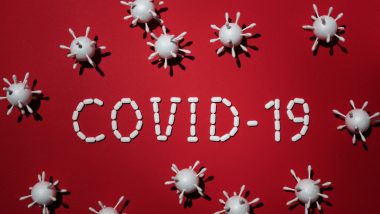New York, October 1: Researchers have shown that an artificial intelligence (AI) algorithm could be trained to classify COVID-19 pneumonia in X-ray scans with up to 90 per cent accuracy, an advance that can lead to the development of a complementary test tool, particularly for vulnerable populations.
The study, published in the journal Nature Communications, demonstrated that the new technique can correctly identify positive COVID-19 cases 84 per cent of the time, and negative cases 93 per cent of the time. Also Read | Clare Bronfman, Seagram’s Liquor Heiress, Sentenced to 6 Years For Involvement in Sex Trafficking.
According to the scientists, including those from the University of Central Florida (UCF) in the US, computed tomography (CT) X-ray scans can offer a deep insight into COVID-19 diagnosis and progression.
They said conventionally used reverse transcription-polymerase chain reaction, or RT-PCR tests, have high false negative rates, and have other challenges like delays in processing. Also Read | Brexit Deal: European Union Starts Legal Action Against UK Over Internal Market Bill.
With CT scans, they said, clinicians can detect COVID-19 in people without symptoms, and also in those who have early symptoms, during the height of the disease, and after symptoms resolve.
However, the scientists said the X ray scan is not always recommended as a diagnostic tool for COVID-19 since the disease often looks similar to influenza-associated pneumonias on the scans. In the new study, the researchers showed that their algorithm can overcome this problem by accurately identifying COVID-19 cases, as well as distinguishing them from influenza.
They believe the algorithm can serve as a great potential aid for physicians. "We demonstrated that a deep learning-based AI approach can serve as a standardised and objective tool to assist healthcare systems as well as patients," said study co-author Ulas Bagci from UCF.
"It can be used as a complementary test tool in very specific limited populations, and it can be used rapidly and at large scale in the unfortunate event of a recurrent outbreak," Bagci said. In the study, the researchers trained a computer algorithm to recognise COVID-19 in lung CT scans of 1,280 multinational patients from China, Japan and Italy.
They then tested the algorithm on CT scans of 1,337 patients with lung diseases ranging from COVID-19 to cancer and non-COVID pneumonia. When the scientists compared the computer's diagnoses with ones confirmed by physicians, they found that the algorithm was extremely proficient in accurately diagnosing COVID-19 pneumonia in the lungs and distinguishing it from other diseases.
"We showed that robust AI models can achieve up to 90 per cent accuracy in independent test populations, maintain high specificity in non-COVID-19 related pneumonias, and demonstrate sufficient generalisability to unseen patient populations and centers," Bagci said.
(This is an unedited and auto-generated story from Syndicated News feed, LatestLY Staff may not have modified or edited the content body)













 Quickly
Quickly




















